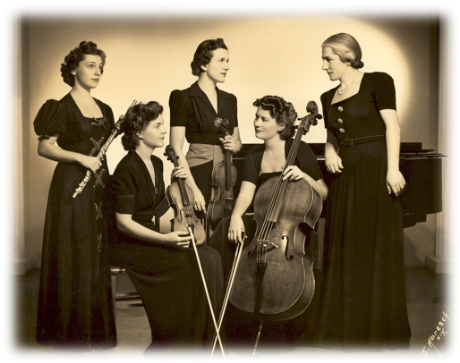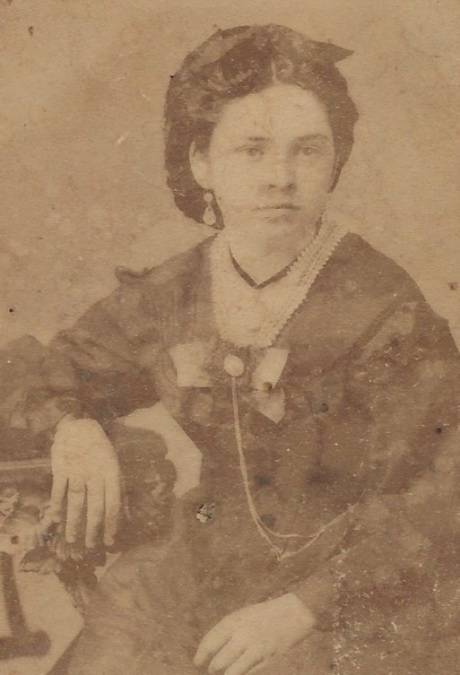Diana Diplarakou Dipson, is seated in forefront, left, with violin. Photo courtesy of Anne Marie Starowitz.
Rose Caccamise will truly be missed by everyone who had the pleasure of knowing her. About 10 years ago Rose contacted me and asked if I would do an article on Diana Dipson. We met a few times and she explained that this famous lady deserved to be remembered. That was so Rose, always thinking of someone else. So, in memory of that beautiful, talented, athletic woman, this is for you, Rose.
-- Anne Marie Starowitz
In 1929 a young girl, who liked her name to be pronounced "Dee-AN’-na," graduated with honors from Batavia High School. She was a member of the National Honor Society, was awarded the Glenn S. Loomis Award for History, and was a member of orchestra and chorus. Her ambition was to be a concert violinist.
Diana Diplarakou Dipson was born in New York City but moved to Batavia as a child. When she was 5 years old she began studying violin in Batavia with August Fricker. She began giving recitals at the age of 11. Many of her recitals were at the State School for the Blind.
She later won a scholarship to the Curtiss Institute of Music in Philadelphia. She received degrees with high honors from Oberlin Conservatory and the Julliard Graduate School of Music. Her music career spanned many decades. She studied in Europe under the direction of George Enesco.
Music reviews of her undeniable talent began in Batavia and followed her career all over the country.
“Diana Dipson is a brilliant artist, possessing an amazing technique. It can be predicted without fear that Miss Dipson will become one of the country’s most accomplished violinists.” Daily News of Batavia, NY, May 16, 1928
Diana’s music career began when she accompanied silent movies at the New Family Theater on Jackson Street. Her father Nikitas D. Dipson operated the theater. As Diana’s career soared so did her father’s in the theater business. Nikitas’ name became synonymous with both movie theaters and drive-in-movie theaters.
Diana performed on radio in Buffalo and Cleveland and before World War II she played in public appearances in Greece.
She later joined the Wheeling Symphony Orchestra in West Virginia, where she was a featured soloist.
In 1939, Diana married George Papulias in New York City at a private ceremony officiated by the Eastern Orthodox Bishop of New York City. The groom was an attorney from Steubenville, Ohio, an amateur violinist, and the son of Greek immigrants who, like the Dipsons, were in the theater business.
The newlyweds sailed the same day on the Italian liner Conte de Savoia for a three-month Mediterranean honeymoon. In June 1940 their son Michael was born. When Michael was 2 years old his parents divorced. He was not raised by either of his parents but was raised by a family in Wellsville.
Diana went to New York City to pursue her musical career in the early '40s. Michael would come to Batavia for Christmas or Easter and stayed at his grandfather’s home on 431 E. Main St.
Diana was disappointed that Michael never learned to play an instrument or read music. According to her, he had perfect pitch. The one thing Michael did have in common with his mother was she had very sensitive ears and could not tolerate hearing instruments played out of tune. To this day her son has the same complaint.
When Michael was in grade school his mother would make arrangements to visit his school in Wellsville and play the violin for his class. She played tunes that appealed to the students and then added some classical medleys. The teachers appreciated her visits and to this day his classmates still reminisce about it.
Diana did fulfill her dream. The headlines in The Daily News March 1, 1944 read “Batavian Chosen First Violinist in a New York City Symphony.” After very competitive auditions, Diana was chosen first violinist and would be a member of the New York City Symphony under Leopold Stokowski, conductor.
Interestingly Mischa Mischakoff, concertmaster of the New York City Symphony, was a soloist in Batavia Civic Orchestra’s second season and perhaps was a colleague of Diana.
During and after World War II she toured military hospitals with the Hospital Music Guild, entertaining wounded servicemen. She had great sympathy for the many servicemen who had been wounded in the war. She found playing her violin for the soldiers gave her great satisfaction.
Michael also shared that his mom was a born mimic and could flawlessly lapse into a variety of dialects. She spoke Greek fluently and could also speak French from her time in Paris. By the time she was 30 she had traveled all over Europe, and had a very cosmopolitan view of customs, culture and cuisine.
While Diana was performing in New York City something musically wonderful was happening at home. Four musicians in the 1940s, John and Helen Grapka, Norman Hall and Muriel Mooney formed a quartet and along with many talented musicians in the area, helped form the Batavia Civic Orchestra later known as the Genesee Symphony Orchestra.
Ironically, their first concert was held at the Dipson Theatre* on Nov. 6, 1947 to a sold-out audience.
In 1955 Diana returned to Batavia and became a member of the Genesee Symphony for six years. She served as a board member for five years. She was first stand with concertmaster John Bobka. She also played in concerts presented by the Fine Arts Division of Geneseo State College and frequently gave offertory performances for local churches.
Diana continued to teach violin to young people and in 1964 served as the concertmistress with the Perry Pops Orchestra. She was later employed in the offices of Dipson Theatres, which still owned or leased about 10 theaters operated by her brother, William Dipson.
In the '70s the community leaders in Batavia, particularly William Dipson, decided to give Main Street a cultural boost. They organized a live performance of an opera, with costumes, scenery, and full orchestra to perform on stage at the Dipson Theatre.
Everybody attended in formal finery as though it were a Hollywood premiere. Michael came to Batavia to escort his mother.
By all accounts, it was a beautiful performance, an afternoon to remember. It was not too long after the gala that the Dipson theatre like many other beautiful buildings became the next target of urban renewal.
Diana continued to live in Batavia in the Dipson home on East Main Street. She had a fear of locking herself out of her apartment so she never locked her door. One day when she came home she found that her violin was stolen; she never played the violin again.
Rose Caccamise from Roxy’s Music store has very fond memories of Diana. She describes Diana as artistic, musical, humble, intelligent, gracious, and a lover of animals, especially her dog Augie. In Rose’s words, “it was a privilege to have known her.”
Diana also taught students to play the violin at Roxy’s Music Store.
Diana Diplarakou Dipson died at St. Luke’s Manor in Batavia in 1997 at the age of 86. Her son is an attorney in Madison County, Virginia, where her ashes are buried.
*Editor's Note: The Dipson Theatre in Batavia was located at 38 Main St. Ground breaking for the movie house was in 1946 and when it opened it had seating for 1,325 people, according to a website called Cinema Treasures.





